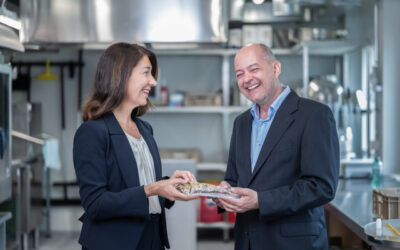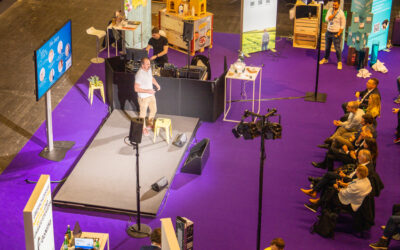Why SFNV’s President Martin Vetterli is quietly confident about the future of food
Martin Vetterli was unanimously voted in for another term as SFNV President at SFNV’s General Assembly in May. We sat down with Martin to talk science, vegetables and why he is quietly confident about the future of food.
What does sustainable food mean to you personally?
Health and pleasure. I’ve eaten a largely vegetarian diet for many years now. I also like to grow my own vegetables, which I enjoy immensely and this gives me the chance to eat local and seasonal products.
What are your predictions for how we will produce, buy and eat food in 2050?
Science will become increasingly important in understanding the processes involved in food assimilation and food processing in particular. Take sugar – materials science has shown that by changing its molecular structure, it can satisfy our sweet tooth in much smaller quantities.
Thanks to science, my hope is that we produce and eat in a much more sustainable way, without losing the mealtime fun.
What has Switzerland got to offer as a food innovation nation?
Switzerland is the ideal laboratory for healthy and sustainable food. We already have a rich ecosystem of startups, SMEs and multinationals in the fields of biotech and foodtech. SFNV has a good foundation and the ambition to become a globally recognized competence center.
Where do you see the biggest opportunities for impact?
Precision nutrition or personalized nutrition is certainly a key opportunity. Everyone’s reaction to a specific food is different and unique. Evaluating an individual’s DNA, microbiome and metabolic response to specific foods helps to determine the most effective dietary plan to prevent or even treat disease. In order to help tackle the climate crisis, we should also focus on the production of new sources of protein with reduced environmental impact. Digitalization will also play an important role in driving more sustainable food systems.
In your opinion, what are the most significant challenges that need to be overcome?
Changing habits. These changes must be of interest to the market economy, which is why the presence of strong partners like Nestlé is so important in associations like SFNV. I also see the role of science as fundamental in this regard. Take food packaging, a topic that EPFL is currently exploring. We have to find solutions that are sustainable, economically feasible, and accepted by consumers.
I’m also a big believer in making small lifestyle changes, like traveling with public transport. Again, this often comes down to our daily habits. We need to shift the default.
What’s the role of academic and research institutions specifically in shaping the future of food?
The role of academic research – with all the academic freedom that this implies – is to provide answers to scientific and societal questions that may arise. And the most burning issue today is very clear: we need a more sustainable food system.
How can we help young people develop the mindset and skills needed to take action on complex issues, like the climate crisis, which impact on individual and planetary health?
We can see that millennials are changing their eating behaviours for a variety of reasons, including health, ecological and economic factors. I am therefore confident. On the EPFL campus, we do whatever it takes to support everyone willing to contribute to a better future: from meatless meals and washable lunch boxes to participatory gardens. I wish that there were initiatives like this when I was a student!
What role does collaboration play in driving change?
We need people from different backgrounds and professions to spread the message and to design solutions that meet diverse needs. In the end, food products have to taste good. Taste is central, otherwise eating habits will not change. The École hôtelière de Lausanne and similar institutions have a major role to play here. And I’m particularly pleased that Chef Franck Giovannini of the Hôtel de Ville de Crissier is one of our ambassadors. Farmers are also central actors in the production chain and must be included in the change process. Science works better when it doesn’t operate in a silo!
Latest News
planetary scales B2B ingredient sales as ALDI Suisse selects Libre® mycoprotein for product launch
Planetary SA (“planetary” or the...
Yumame Foods and Le Patron partner for a delicious, plant-based future of food
Valley partner Yumame Foods and the...
What the food industry can learn from GDI’s Major Shifts model
The future is coming faster than many...
Meet the finalists of the Igeho Rising Star Award for 2025
Many startups applied. 15 made it to...




